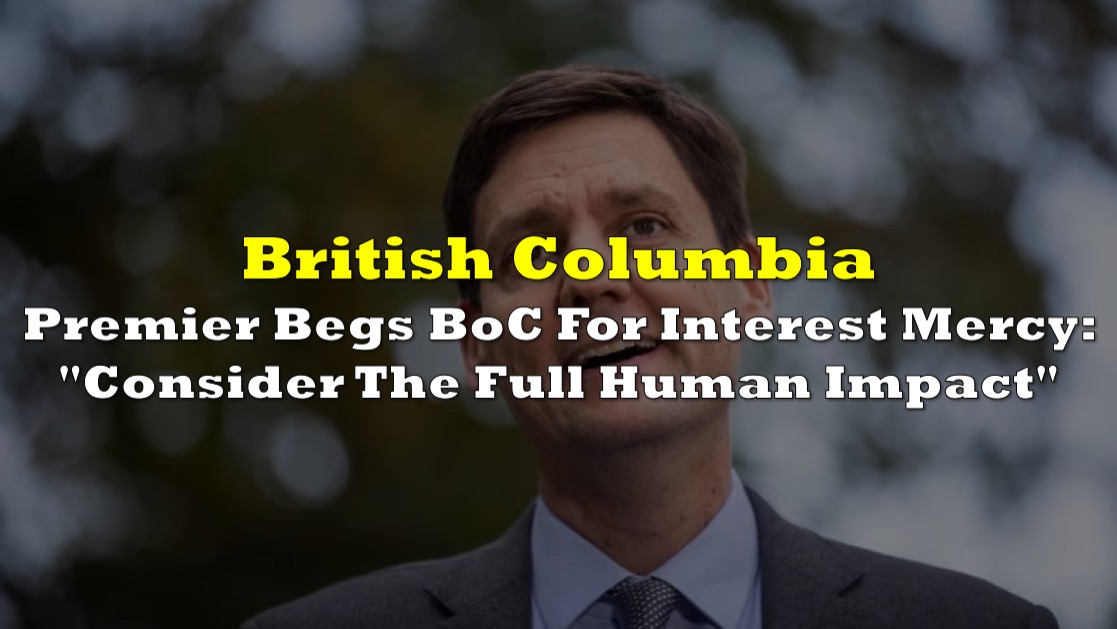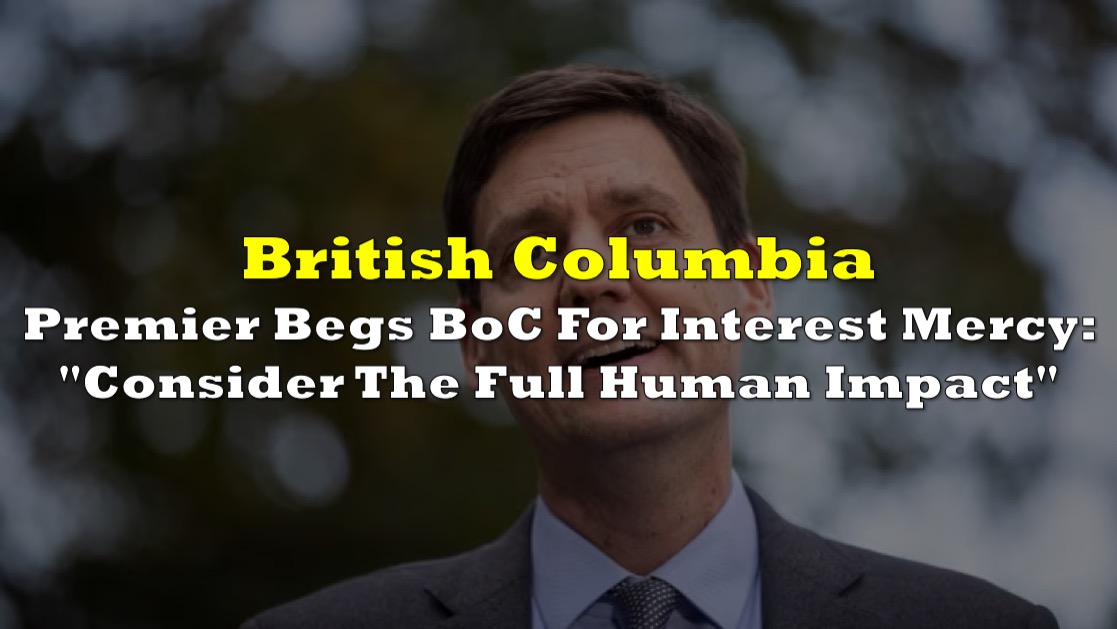Economics
BC Premier Begs BoC For Interest Mercy: “Consider The Full Human Impact”
British Columbia’s Premier, David Eby, has taken a bold stance on the looming interest rate hike in September, expressing his
The post BC Premier Begs…

British Columbia’s Premier, David Eby, has taken a bold stance on the looming interest rate hike in September, expressing his concerns in a letter addressed to Governor Tiff Macklem of the Bank of Canada. Eby emphasized the adverse impact that this rate increase could have on the people of British Columbia.
“In your role as Governor, I urge you to consider the full human impact of rate increases and not further increase rates at this time,” Eby wrote Thursday to Macklem.
In his letter, Eby commended the Bank of Canada for its efforts in curbing inflation and alleviating financial pressures on individuals and businesses. However, he urged Macklem to carefully consider the human repercussions of another interest rate hike at this juncture.
The premier pointed out that despite widespread cautions, including warnings from senior economists at institutions like CIBC, the Bank of Canada is actively contemplating a September rate hike.
“This serious consideration comes despite cautions against such an approach from all quarters in Canada… While the role of the Bank of Canada is to make decisions about monetary policy, my role as Premier is to stand up for people in B.C. and ensure their voices are heard as decisions are made that impact them,” he added.
The last rate hike in July raised the Bank of Canada’s key interest rate to 5%, the highest level in over two decades. The governing body attributed this hike to increased economic demand driven by robust consumer spending and persistent price escalations.
“These decisions are difficult, and we did discuss the possibility of holding rates unchanged and gathering more information to confirm the need to raise the policy rate,” Macklem said in July.
Eby warned that the consequences of these rate hikes are only in their early stages, and more challenges lie ahead. He highlighted the International Monetary Fund’s concern that Canada now faces the highest risk of mortgage defaults and foreclosures among advanced economies.
He further stressed that the adverse effects of further rate increases extend beyond homeowners to renters, young people, seniors, families, and small business owners with car loans or lines of credit. He noted that even those who were starting to recover from the COVID-19 pandemic would be pushed to the brink by additional rate hikes.
Statistics Canada recently revealed that mortgage rates are the leading contributor to inflation. Eby cautioned that another hike could lead to higher mortgage rates, exacerbating inflation further.
“We need to build more housing to bring costs down,” he said in his letter to Macklem, which was also sent to Prime Minister Justin Trudeau. “This quiet but devastating impact of rate increases will result in even higher housing costs, feeding further inflation.”
To combat these challenges, Eby called on the Bank of Canada to recognize the impacts of its actions and explore alternative solutions. He also indicated a willingness to collaborate with the federal government on coordinated measures to achieve cost stability and long-term deflationary benefits.
Some economists questioned the timing of Eby’s letter as they believe it aligns with the market’s anticipation of the Bank of Canada nearing the end of its rate hike cycle. Central 1 Credit Union’s Chief Economist, Bryan Yu, stated that there are already many voices advocating for a rate hold in September. He highlighted that inflation, while briefly elevated in July, is showing signs of moderation, and the economy is slowing down.
“It is a question of, is it some theatre?” Yu said.
Yu agreed that addressing the housing supply issue is crucial but cautioned that rate reductions are unlikely to occur as rapidly as the increases. He forecasted that by 2025, rates would stabilize at around 2 to 2.5 percent.
In response to inquiries about why he addressed the Bank of Canada, a non-political body, Eby asserted his duty as the Premier of British Columbia to speak out on issues affecting its residents. He emphasized the pressing concerns related to rising interest rates and their impact on families, individuals, and the housing market.
“I think it is critically important to go on the record as the premier of British Columbia, to point out to the Bank of Canada, that Statistics Canada is saying that the biggest driver of inflation in our country right now is rising mortgage rates,” he reasoned. “I think if the governor of the Bank of Canada wakes up this morning, and one of the first things he’s thinking about is how will that rate increase impact British Columbians, I think my job is done.”
Information for this story was found via the CityNews and the sources mentioned. The author has no securities or affiliations related to the organizations discussed. Not a recommendation to buy or sell. Always do additional research and consult a professional before purchasing a security. The author holds no licenses.
The post BC Premier Begs BoC For Interest Mercy: “Consider The Full Human Impact” appeared first on the deep dive.
inflation
monetary
policy
interest rates
monetary policy
deflationary

Argentina Is One of the Most Regulated Countries in the World
In the coming days and weeks, we can expect further, far‐reaching reform proposals that will go through the Argentine congress.
Crypto, Crude, & Crap Stocks Rally As Yield Curve Steepens, Rate-Cut Hopes Soar
Crypto, Crude, & Crap Stocks Rally As Yield Curve Steepens, Rate-Cut Hopes Soar
A weird week of macro data – strong jobless claims but…
Fed Pivot: A Blend of Confidence and Folly
Fed Pivot: Charting a New Course in Economic Strategy Dec 22, 2023 Introduction In the dynamic world of economics, the Federal Reserve, the central bank…
















